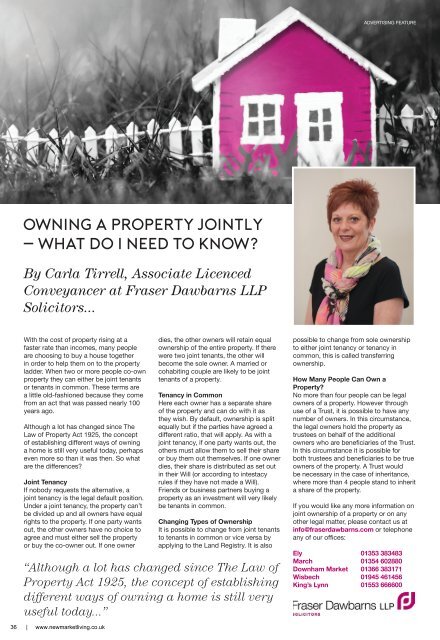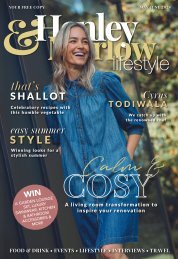Newmarket and Ely Living Dec 2019 - Jan 2020
The fantastic festive issue is here, packed with local events, Christmas fun, delicious recipes, chef Michael Caines plus travel to Oman and advice on buying a new home.
The fantastic festive issue is here, packed with local events, Christmas fun, delicious recipes, chef Michael Caines plus travel to Oman and advice on buying a new home.
You also want an ePaper? Increase the reach of your titles
YUMPU automatically turns print PDFs into web optimized ePapers that Google loves.
ADVERTISING FEATURE<br />
Owning a Property Jointly<br />
– What do I need to Know?<br />
By Carla Tirrell, Associate Licenced<br />
Conveyancer at Fraser Dawbarns LLP<br />
Solicitors...<br />
With the cost of property rising at a<br />
faster rate than incomes, many people<br />
are choosing to buy a house together<br />
in order to help them on to the property<br />
ladder. When two or more people co-own<br />
property they can either be joint tenants<br />
or tenants in common. These terms are<br />
a little old-fashioned because they come<br />
from an act that was passed nearly 100<br />
years ago.<br />
Although a lot has changed since The<br />
Law of Property Act 1925, the concept<br />
of establishing different ways of owning<br />
a home is still very useful today, perhaps<br />
even more so than it was then. So what<br />
are the differences?<br />
Joint Tenancy<br />
If nobody requests the alternative, a<br />
joint tenancy is the legal default position.<br />
Under a joint tenancy, the property can’t<br />
be divided up <strong>and</strong> all owners have equal<br />
rights to the property. If one party wants<br />
out, the other owners have no choice to<br />
agree <strong>and</strong> must either sell the property<br />
or buy the co-owner out. If one owner<br />
dies, the other owners will retain equal<br />
ownership of the entire property. If there<br />
were two joint tenants, the other will<br />
become the sole owner. A married or<br />
cohabiting couple are likely to be joint<br />
tenants of a property.<br />
Tenancy in Common<br />
Here each owner has a separate share<br />
of the property <strong>and</strong> can do with it as<br />
they wish. By default, ownership is split<br />
equally but if the parties have agreed a<br />
different ratio, that will apply. As with a<br />
joint tenancy, if one party wants out, the<br />
others must allow them to sell their share<br />
or buy them out themselves. If one owner<br />
dies, their share is distributed as set out<br />
in their Will (or according to intestacy<br />
rules if they have not made a Will).<br />
Friends or business partners buying a<br />
property as an investment will very likely<br />
be tenants in common.<br />
Changing Types of Ownership<br />
It is possible to change from joint tenants<br />
to tenants in common or vice versa by<br />
applying to the L<strong>and</strong> Registry. It is also<br />
“Although a lot has changed since The Law of<br />
Property Act 1925, the concept of establishing<br />
different ways of owning a home is still very<br />
useful today...”<br />
36 | www.newmarketliving.co.uk<br />
possible to change from sole ownership<br />
to either joint tenancy or tenancy in<br />
common, this is called transferring<br />
ownership.<br />
How Many People Can Own a<br />
Property?<br />
No more than four people can be legal<br />
owners of a property. However through<br />
use of a Trust, it is possible to have any<br />
number of owners. In this circumstance,<br />
the legal owners hold the property as<br />
trustees on behalf of the additional<br />
owners who are beneficiaries of the Trust.<br />
In this circumstance it is possible for<br />
both trustees <strong>and</strong> beneficiaries to be true<br />
owners of the property. A Trust would<br />
be necessary in the case of inheritance,<br />
where more than 4 people st<strong>and</strong> to inherit<br />
a share of the property.<br />
If you would like any more information on<br />
joint ownership of a property or on any<br />
other legal matter, please contact us at<br />
info@fraserdawbarns.com or telephone<br />
any of our offices:<br />
<strong>Ely</strong> 01353 383483<br />
March 01354 602880<br />
Downham Market 01366 383171<br />
Wisbech 01945 461456<br />
King’s Lynn 01553 666600


















